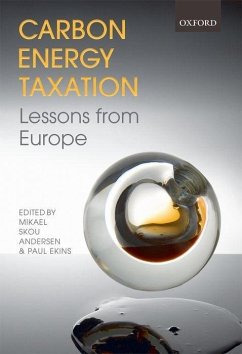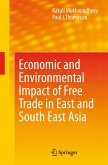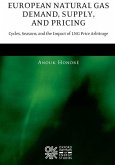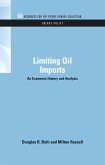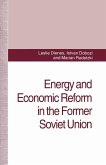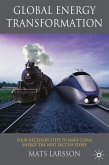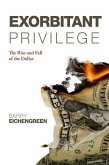Carbon-Energy Taxation
Lessons from Europe
Ed. by Andersen, Mikael Skou; Ekins, Paul
Schade – dieser Artikel ist leider ausverkauft. Sobald wir wissen, ob und wann der Artikel wieder verfügbar ist, informieren wir Sie an dieser Stelle.
Carbon-Energy Taxation
Lessons from Europe
Ed. by Andersen, Mikael Skou; Ekins, Paul
- Gebundenes Buch
- Merkliste
- Auf die Merkliste
- Bewerten Bewerten
- Teilen
- Produkt teilen
- Produkterinnerung
- Produkterinnerung
This book offers an extensive analysis of carbon-energy taxation that addresses the interplay between carbon-energy taxation and emissions trading, as well as the implications for future international climate policy.
Target group: Academics, researchers and graduate students in energy economics, environmental economics, European studies and taxation. Policymakers, professionals and politicians in tax, energy, transport and environment administrations
Andere Kunden interessierten sich auch für
![Economic and Environmental Impact of Free Trade in East and South East Asia Economic and Environmental Impact of Free Trade in East and South East Asia]() Kakali MukhopadhyayEconomic and Environmental Impact of Free Trade in East and South East Asia75,99 €
Kakali MukhopadhyayEconomic and Environmental Impact of Free Trade in East and South East Asia75,99 €![European Natural Gas Demand, Supply, and Pricing European Natural Gas Demand, Supply, and Pricing]() Anouk HonoreEuropean Natural Gas Demand, Supply, and Pricing105,99 €
Anouk HonoreEuropean Natural Gas Demand, Supply, and Pricing105,99 €![Limiting Oil Imports Limiting Oil Imports]() Douglas R BohiLimiting Oil Imports101,99 €
Douglas R BohiLimiting Oil Imports101,99 €![Energy and Economic Reform in the Former Soviet Union Energy and Economic Reform in the Former Soviet Union]() L. DienesEnergy and Economic Reform in the Former Soviet Union112,99 €
L. DienesEnergy and Economic Reform in the Former Soviet Union112,99 €![Global Energy Transformation Global Energy Transformation]() Mats LarssonGlobal Energy Transformation30,99 €
Mats LarssonGlobal Energy Transformation30,99 €![Exorbitant Privilege Exorbitant Privilege]() Barry EichengreenExorbitant Privilege60,99 €
Barry EichengreenExorbitant Privilege60,99 €
This book offers an extensive analysis of carbon-energy taxation that addresses the interplay between carbon-energy taxation and emissions trading, as well as the implications for future international climate policy.
Target group: Academics, researchers and graduate students in energy economics, environmental economics, European studies and taxation. Policymakers, professionals and politicians in tax, energy, transport and environment administrations
Target group: Academics, researchers and graduate students in energy economics, environmental economics, European studies and taxation. Policymakers, professionals and politicians in tax, energy, transport and environment administrations
Produktdetails
- Produktdetails
- Verlag: Oxford University Press
- Seitenzahl: 342
- Erscheinungstermin: 18. Januar 2010
- Englisch
- Abmessung: 240mm x 163mm x 33mm
- Gewicht: 687g
- ISBN-13: 9780199570683
- ISBN-10: 019957068X
- Artikelnr.: 26580152
- Herstellerkennzeichnung
- Libri GmbH
- Europaallee 1
- 36244 Bad Hersfeld
- gpsr@libri.de
- Verlag: Oxford University Press
- Seitenzahl: 342
- Erscheinungstermin: 18. Januar 2010
- Englisch
- Abmessung: 240mm x 163mm x 33mm
- Gewicht: 687g
- ISBN-13: 9780199570683
- ISBN-10: 019957068X
- Artikelnr.: 26580152
- Herstellerkennzeichnung
- Libri GmbH
- Europaallee 1
- 36244 Bad Hersfeld
- gpsr@libri.de
Mikael Skou Andersen is Professor in Policy Analysis at Denmark's National Environmental Research Institute (NERI), Aarhus University. His PhD and Master's degrees were obtained from the Faculty of Social Sciences at Aarhus University, where he was previously also a tenured Associate Professor in the Department of Political Science and Head of the Policy Analysis section. He also holds a degree in Environmental Studies from the Faculty of Natural Sciences. He was a member of the Danish Minister of Taxation's Working Group on CO2 and since 2005 has been a member of the European Commission's High-level Network of Environmental Economists. He was a co-founder of the Centre for Social Science Research on the Environment (CESAM) 1992-2001, and has been scientific coordinator for several EU research projects, including COMETR. Paul Ekins has a PhD in economics from Birkbeck College, and a BSc in electrical engineering from Imperial College. He joined King's College London as Professor of Energy and Environment Policy in January 2008, having been Head of the Environment Group at the Policy Studies Institute and Professor of Sustainable Development at the University of Westminster since 2002. He was a Member of the Royal Commission on Environmental Pollution from 2002-2008 and, from 2003-2007, was on the UK Government's Sustainable Energy Policy Advisory Board. He is a Co-Director of the UK Energy Research Centre, in charge of its Energy Systems and Modelling theme, and leads King's College's involvement in large research consortia on Bioenergy and Hydrogen. He is also Chairman of the National Industrial Symbiosis Programme (NISP), the UK's most effective initiative at promoting resource efficiency in industry.
* Preface
* Pricing of Carbon in Europe
* 1: Mikael Skou Andersen: Carbon-energy taxation, revenue recycling
and competitiveness
* 2: Stefan Speck and Jirina Jilkova: Design of Environmental Tax
Reforms in Europe
* Industry Sector Competitiveness
* 3: John Fitz Gerald, Mary Keeney and Sue Scott: Assessing
Vulnerability of Selected Sectors under Environmental Tax Reform: the
issue of pricing power
* 4: Roger Salmons and Alexandra Miltner: Trends in the competitiveness
of selected industrial sectors in ETR countries
* 5: Martin Enevoldsen, Anders Ryelund and Mikael Skou Andersen: The
impact of energy taxes on competitiveness: a panel regression study
of 56 European industry sectors
* 6: Mikael Skou Andersen and Stefan Speck: Energy-intensive
industries: Approaches to mitigation and compensation
* Country Competitiveness and Carbon Leakage
* 7: Terry Barker, Sudhir Junankar, Hector Pollitt and Philip
Summerton: The Effects of Environmental Tax Reform on International
Competitiveness in the European Union: modelling with E3ME
* 8: Terry Barker, Sudhir Junankar, Hector Pollitt and Philip
Summerton: Carbon leakage from unilateral environmental tax reforms
in Europe, 1995-2005
* Implications for Future Climate Policy
* 9: Paul Ekins: Carbon Taxes and Emissions Trading: Issues and
Interactions
* 10: Mikael Skou Andersen and Paul Ekins: Conclusions - Europe's
lessons from carbon-energy taxation
* Annex- tables A.1 to A.23
* Pricing of Carbon in Europe
* 1: Mikael Skou Andersen: Carbon-energy taxation, revenue recycling
and competitiveness
* 2: Stefan Speck and Jirina Jilkova: Design of Environmental Tax
Reforms in Europe
* Industry Sector Competitiveness
* 3: John Fitz Gerald, Mary Keeney and Sue Scott: Assessing
Vulnerability of Selected Sectors under Environmental Tax Reform: the
issue of pricing power
* 4: Roger Salmons and Alexandra Miltner: Trends in the competitiveness
of selected industrial sectors in ETR countries
* 5: Martin Enevoldsen, Anders Ryelund and Mikael Skou Andersen: The
impact of energy taxes on competitiveness: a panel regression study
of 56 European industry sectors
* 6: Mikael Skou Andersen and Stefan Speck: Energy-intensive
industries: Approaches to mitigation and compensation
* Country Competitiveness and Carbon Leakage
* 7: Terry Barker, Sudhir Junankar, Hector Pollitt and Philip
Summerton: The Effects of Environmental Tax Reform on International
Competitiveness in the European Union: modelling with E3ME
* 8: Terry Barker, Sudhir Junankar, Hector Pollitt and Philip
Summerton: Carbon leakage from unilateral environmental tax reforms
in Europe, 1995-2005
* Implications for Future Climate Policy
* 9: Paul Ekins: Carbon Taxes and Emissions Trading: Issues and
Interactions
* 10: Mikael Skou Andersen and Paul Ekins: Conclusions - Europe's
lessons from carbon-energy taxation
* Annex- tables A.1 to A.23
* Preface
* Pricing of Carbon in Europe
* 1: Mikael Skou Andersen: Carbon-energy taxation, revenue recycling
and competitiveness
* 2: Stefan Speck and Jirina Jilkova: Design of Environmental Tax
Reforms in Europe
* Industry Sector Competitiveness
* 3: John Fitz Gerald, Mary Keeney and Sue Scott: Assessing
Vulnerability of Selected Sectors under Environmental Tax Reform: the
issue of pricing power
* 4: Roger Salmons and Alexandra Miltner: Trends in the competitiveness
of selected industrial sectors in ETR countries
* 5: Martin Enevoldsen, Anders Ryelund and Mikael Skou Andersen: The
impact of energy taxes on competitiveness: a panel regression study
of 56 European industry sectors
* 6: Mikael Skou Andersen and Stefan Speck: Energy-intensive
industries: Approaches to mitigation and compensation
* Country Competitiveness and Carbon Leakage
* 7: Terry Barker, Sudhir Junankar, Hector Pollitt and Philip
Summerton: The Effects of Environmental Tax Reform on International
Competitiveness in the European Union: modelling with E3ME
* 8: Terry Barker, Sudhir Junankar, Hector Pollitt and Philip
Summerton: Carbon leakage from unilateral environmental tax reforms
in Europe, 1995-2005
* Implications for Future Climate Policy
* 9: Paul Ekins: Carbon Taxes and Emissions Trading: Issues and
Interactions
* 10: Mikael Skou Andersen and Paul Ekins: Conclusions - Europe's
lessons from carbon-energy taxation
* Annex- tables A.1 to A.23
* Pricing of Carbon in Europe
* 1: Mikael Skou Andersen: Carbon-energy taxation, revenue recycling
and competitiveness
* 2: Stefan Speck and Jirina Jilkova: Design of Environmental Tax
Reforms in Europe
* Industry Sector Competitiveness
* 3: John Fitz Gerald, Mary Keeney and Sue Scott: Assessing
Vulnerability of Selected Sectors under Environmental Tax Reform: the
issue of pricing power
* 4: Roger Salmons and Alexandra Miltner: Trends in the competitiveness
of selected industrial sectors in ETR countries
* 5: Martin Enevoldsen, Anders Ryelund and Mikael Skou Andersen: The
impact of energy taxes on competitiveness: a panel regression study
of 56 European industry sectors
* 6: Mikael Skou Andersen and Stefan Speck: Energy-intensive
industries: Approaches to mitigation and compensation
* Country Competitiveness and Carbon Leakage
* 7: Terry Barker, Sudhir Junankar, Hector Pollitt and Philip
Summerton: The Effects of Environmental Tax Reform on International
Competitiveness in the European Union: modelling with E3ME
* 8: Terry Barker, Sudhir Junankar, Hector Pollitt and Philip
Summerton: Carbon leakage from unilateral environmental tax reforms
in Europe, 1995-2005
* Implications for Future Climate Policy
* 9: Paul Ekins: Carbon Taxes and Emissions Trading: Issues and
Interactions
* 10: Mikael Skou Andersen and Paul Ekins: Conclusions - Europe's
lessons from carbon-energy taxation
* Annex- tables A.1 to A.23

